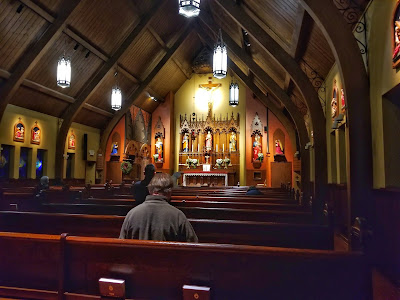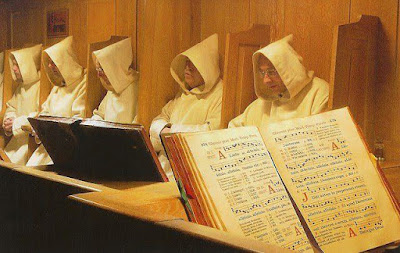As we draw closer to Good Friday, there are often liturgical questions on the prayer of the Church for the conversion of the Jews. But first, please understand what we mean by the involvement in the Jews in Christ's Passion and Death. It's important to first read "Are the Jews Responsible for Christ's Death" before continuing.
The primary question concerning references to Jews during Holy Week is usually around the prayer for the Jews in the Good Friday Liturgy (known traditionally as the Liturgy of the Presanctified). Here is a summary of those changes
Traditional Pre-1955 Prayer for the Jews
As part of the Great Intercessions, the priest prays, "Let us pray also for the perfidious Jews: that our God and Lord would remove the veil from their hearts: that they also may acknowledge our Lord Jesus Christ." Then after he says "Oremus" this prayer is prayed: "Almighty and everlasting God, who drivest not away from Thy mercy even the perfidious Jews: hear our prayers, which we offer for the blindness of that people: that, acknowledging the light of Thy truth, which is Christ, they may be rescued from their darkness. Through our Lord Jesus Christ, Thy Son, who liveth and reigneth with Thee in the unity of the Holy Ghost, God, world without end. R. Amen."
What differs in pre-1955 is that while in all of the Great Intercessions one kneels after the Oremus, it does not take place during the Good Friday Prayer for the Jews. Why? The Church's Year by Father Leonard Goffine explains:
"After the [chanting of the account of the Passion according to St. John] the priest prays in behalf of the one, only true Church, that she may increase, and that peace and unity may always remain with her; for the pope, that his government may be blessed; for the bishops, priests, the clergy, and the people, that they may serve God in justice; for those converted to the faith, that they may continue to grow a knowledge and a zeal for the holy religion; for rulers as defenders of the Church, that they may govern with wisdom and justice, and that those under them may be loyal to them with fidelity and obedience; for the unfortunate, that God may have mercy on them; for heretics and apostates, that they may be brought back from error to the truth of the Catholic faith; for the Jews, that they may be enlightened; for the heathens, that they may be converted. Before each prayer the priest says Oremus, Let us pray Flectamus genua, (Let us kneel) when kneeling, we say Amen, and at the call Levate (Rise up) we rise: except at the prayer for the Jews, when the genuflection is omitted because the Jews bent the knee in mockery before our Lord."
1955 Prayer for the Jews
As part of the changes to Holy Week, the flectamus genua was added back to the prayer.
1959 Prayer for the Jews
Likely due to failure to understand the meaning of "perfidious", which means "incredulous" but which some people falsely thought to mean “treacherous," Pope John XXIII removed the word from the prayer and interrupts the Good Friday Liturgy when the prayer was read, asking for it to be read again without using the word.
1962 Prayer for the Jews:
The prayer as changed in 1959, omitting perfidious and adding the flectamus genua, is what was included in the 1962 Missal and stayed as such until 2008.
The 1962 Prayer for the Jews (Amended in 2008):
The 1962 Missal which is the most widely used Missal for the Traditional Latin Mass was ordered to change the prayer from its prior version, as mentioned immediately above, to a new prayer composed by Pope Benedict XVI in 2008. That modified prayer reads:
"Let us pray for the Jews: May our God and Lord enlighten their hearts, so that they may acknowledge Jesus Christ, Saviour of all men." The priest prays "Oremus" and then adds the flectamus genua to kneel, still in rupture with the past tradition.
Rising, he prays: "Almighty and Everlasting God, who desirest that all men be saved and come to the knowledge of the truth; mercifully grant that, as the fullness of the Gentiles enters into Thy Church, all Israel may be saved. Through Christ our Lord. Amen."
Novus Ordo Prayer for the Jews
In the Novus Ordo, the changes become even more drastic and straying from our purpose of praying for the conversion of the Jews. The prayer currently prayed in the Novus Ordo as written in 1970 by Pope Paul VI is as follows.
The priest prays as part of the General Intercessions: "Let us pray also for the Jewish people, to whom the Lord our God spoke first, that he may grant them to advance in love of his name and in faithfulness to his covenant."
The priest adds: "Almighty ever-living God, who bestowed your promises on Abraham and his descendants, hear graciously the prayers of your Church, that the people you first made your own may attain the fullness of redemption. Through Christ our Lord."
The website of Corpus Christi Watershed has more information on these prayers as they changed over the years.
Victimae Paschali Laudes
Yet, this is not the only matter concerning mention of the Jews in prayers during Holy Week. The following is taken from the Easter Sequence, the Victimae Paschali Laudes.
Before the Tridentine Reforms, the Victimae Paschali Laudes included a line that read, "It is more fitting to believe in truthful Mary alone, rather than in the lying multitude of the Jews." For those looking to chant this version of the prayer, which was changed nearly 500 years ago, a pdf is available for download.
The key takeaway is that while politically incorrect, we can and should still pray for the conversion of the Jews. We desire for them, and for all mankind, to enter the Catholic Church, the ark outside of which no salvation may be found. We pray for the Jews in the traditional Octave of Christian Unity in January of each year as well.
Read more >>
The primary question concerning references to Jews during Holy Week is usually around the prayer for the Jews in the Good Friday Liturgy (known traditionally as the Liturgy of the Presanctified). Here is a summary of those changes
Traditional Pre-1955 Prayer for the Jews
As part of the Great Intercessions, the priest prays, "Let us pray also for the perfidious Jews: that our God and Lord would remove the veil from their hearts: that they also may acknowledge our Lord Jesus Christ." Then after he says "Oremus" this prayer is prayed: "Almighty and everlasting God, who drivest not away from Thy mercy even the perfidious Jews: hear our prayers, which we offer for the blindness of that people: that, acknowledging the light of Thy truth, which is Christ, they may be rescued from their darkness. Through our Lord Jesus Christ, Thy Son, who liveth and reigneth with Thee in the unity of the Holy Ghost, God, world without end. R. Amen."
What differs in pre-1955 is that while in all of the Great Intercessions one kneels after the Oremus, it does not take place during the Good Friday Prayer for the Jews. Why? The Church's Year by Father Leonard Goffine explains:
"After the [chanting of the account of the Passion according to St. John] the priest prays in behalf of the one, only true Church, that she may increase, and that peace and unity may always remain with her; for the pope, that his government may be blessed; for the bishops, priests, the clergy, and the people, that they may serve God in justice; for those converted to the faith, that they may continue to grow a knowledge and a zeal for the holy religion; for rulers as defenders of the Church, that they may govern with wisdom and justice, and that those under them may be loyal to them with fidelity and obedience; for the unfortunate, that God may have mercy on them; for heretics and apostates, that they may be brought back from error to the truth of the Catholic faith; for the Jews, that they may be enlightened; for the heathens, that they may be converted. Before each prayer the priest says Oremus, Let us pray Flectamus genua, (Let us kneel) when kneeling, we say Amen, and at the call Levate (Rise up) we rise: except at the prayer for the Jews, when the genuflection is omitted because the Jews bent the knee in mockery before our Lord."
1955 Prayer for the Jews
As part of the changes to Holy Week, the flectamus genua was added back to the prayer.
1959 Prayer for the Jews
Likely due to failure to understand the meaning of "perfidious", which means "incredulous" but which some people falsely thought to mean “treacherous," Pope John XXIII removed the word from the prayer and interrupts the Good Friday Liturgy when the prayer was read, asking for it to be read again without using the word.
1962 Prayer for the Jews:
The prayer as changed in 1959, omitting perfidious and adding the flectamus genua, is what was included in the 1962 Missal and stayed as such until 2008.
The 1962 Prayer for the Jews (Amended in 2008):
The 1962 Missal which is the most widely used Missal for the Traditional Latin Mass was ordered to change the prayer from its prior version, as mentioned immediately above, to a new prayer composed by Pope Benedict XVI in 2008. That modified prayer reads:
"Let us pray for the Jews: May our God and Lord enlighten their hearts, so that they may acknowledge Jesus Christ, Saviour of all men." The priest prays "Oremus" and then adds the flectamus genua to kneel, still in rupture with the past tradition.
Rising, he prays: "Almighty and Everlasting God, who desirest that all men be saved and come to the knowledge of the truth; mercifully grant that, as the fullness of the Gentiles enters into Thy Church, all Israel may be saved. Through Christ our Lord. Amen."
Novus Ordo Prayer for the Jews
In the Novus Ordo, the changes become even more drastic and straying from our purpose of praying for the conversion of the Jews. The prayer currently prayed in the Novus Ordo as written in 1970 by Pope Paul VI is as follows.
The priest prays as part of the General Intercessions: "Let us pray also for the Jewish people, to whom the Lord our God spoke first, that he may grant them to advance in love of his name and in faithfulness to his covenant."
The priest adds: "Almighty ever-living God, who bestowed your promises on Abraham and his descendants, hear graciously the prayers of your Church, that the people you first made your own may attain the fullness of redemption. Through Christ our Lord."
The website of Corpus Christi Watershed has more information on these prayers as they changed over the years.
Victimae Paschali Laudes
Yet, this is not the only matter concerning mention of the Jews in prayers during Holy Week. The following is taken from the Easter Sequence, the Victimae Paschali Laudes.
Before the Tridentine Reforms, the Victimae Paschali Laudes included a line that read, "It is more fitting to believe in truthful Mary alone, rather than in the lying multitude of the Jews." For those looking to chant this version of the prayer, which was changed nearly 500 years ago, a pdf is available for download.
The key takeaway is that while politically incorrect, we can and should still pray for the conversion of the Jews. We desire for them, and for all mankind, to enter the Catholic Church, the ark outside of which no salvation may be found. We pray for the Jews in the traditional Octave of Christian Unity in January of each year as well.
























